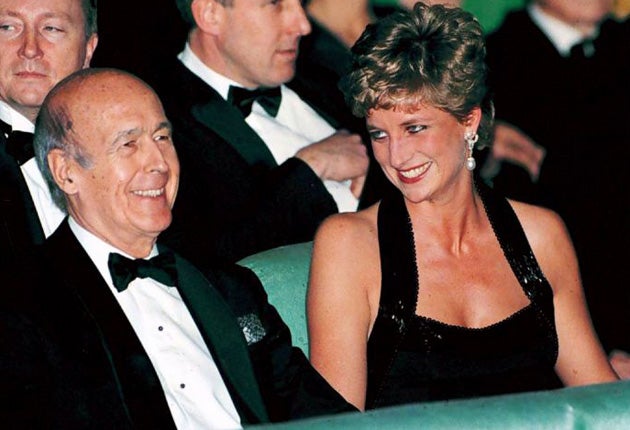C'est l'amour? Diana and the dedication that launched a thousand speculations

Your support helps us to tell the story
From reproductive rights to climate change to Big Tech, The Independent is on the ground when the story is developing. Whether it's investigating the financials of Elon Musk's pro-Trump PAC or producing our latest documentary, 'The A Word', which shines a light on the American women fighting for reproductive rights, we know how important it is to parse out the facts from the messaging.
At such a critical moment in US history, we need reporters on the ground. Your donation allows us to keep sending journalists to speak to both sides of the story.
The Independent is trusted by Americans across the entire political spectrum. And unlike many other quality news outlets, we choose not to lock Americans out of our reporting and analysis with paywalls. We believe quality journalism should be available to everyone, paid for by those who can afford it.
Your support makes all the difference.It is the tale of a secret love between a dashing French president and an attractive yet desperately unhappy princess who happens to hail from Wales. The book, penned by the former French head of state Valéry Giscard d'Estaing, opens with the inscription "Promise kept" and ends with the equally intriguing line: "'You asked me for permission for you to write your story,' she told me. 'I give you it, but you must make me a promise ...'".
Is this wishful thinking by the president-cum-author or a sensational revelation that he was a confidant, if not a lover, of Diana, Princess of Wales? "Fiction or reality?" asked the French daily Le Figaro. "Only the former president has the key to this troubling story."
La Princesse et le Président is due to be published next week. On the basis of leaked extracts, Prince Charles and Camilla, Duchess of Cornwall, are unlikely to be joining the stampede to Parisian bookshops to secure a copy.
The novel tells the tale of Princess Patricia of Cardiff and President Jacques-Henri Lambertye, who meet at Buckingham Palace during a dinner to mark the end of a G7 summit.
The young princess reveals the stresses of dealing with the media spotlight while her husband carries on behind the scenes with his old lover: "Ten days before my wedding, my future husband came to tell me that he had a mistress and that he had decided to continue his relationship with her even after our marriage."
A passionate liaison between the Welsh royal and the French leader ensues in country houses across France. The narrator recounts: "I kissed her hand and she gave me a questioning look, her slate-grey eyes widening as she tilted her head gently forward."
Later, they take a train after the 1984 D-Day landing commemorations in Normandy and President Lambertye, taking advantage of the cover offered by a table, clasps the princess's hand.
Princess Diana and Mr Giscard d'Estaing have not been romantically linked before but they did meet at banquets and receptions. When the princess died in Paris in 1997, Mr Giscard d'Estaing and his wife were reportedly the first to send flowers to the hospital where she had been treated.
Mr Giscard d'Estaing, who ruled France for seven years and crafted the Lisbon Treaty, had a reputation for affairs. In the 1970s, he reportedly crashed his car while returning from a clandestine rendez-vous.
The novel is peppered with references to his meetings with Diana. And in another echo, Patricia spends her time doing charitable work for HIV victims and landmine charities.
There is one glaring discrepancy. While the fictional President Lambertye wins a second term with a comfortable 56 per cent, Mr Giscard d'Estaing was dumped after a single term. He lost the vote in May 1981, two months before Diana married Charles, and thus the pair were never "the Princess and the President" at the same time.
That hasn't stopped people marvelling or recoiling at the possibility which the novel raises. Etienne de Montety, a literary critic for Le Figaro which published extracts yesterday, wrote: "Discovering this incredible modern story, one can never for a moment forget who is the narrator. One muses, amazed, about his stature in international public life."
The magazine Marianne found the book distasteful: "How does he want posterity to remember him? As the person who legalised abortion? Who gave 18-year-olds the vote? Who brought female ministers into government? By talking about Diana, Giscard is remaking himself as the great inventor of the celebrity presidency. A low-brow gossip president."
*La Princesse et le Président is published on 1 October by Fallois-Xo
Extracts from La Princesse et le Président
* "I stood up and pulled back my chair to allow the Princess of Cardiff to sit down. She thanked me with one of those oblique looks that impressed upon me all her charm."
* "I returned to the Elysée Palace, and went up the steps, my head on fire, and my heart radiating with happiness."
* "I didn't have what one would call an appetite for power, rather an interest in power."
* "I can still hear her saying it in English.... 'I wish that you love me'"
* "I'm going to tell you what's happened to me ... Ten days before my wedding, my future husband came to tell me that he had a mistress and that he had decided to continue his relationship with her even after our marriage."
* "The Morning Telegraph had a front-page headline that I translated: "The Cardiff princess spent the night at the French President's castle."
Join our commenting forum
Join thought-provoking conversations, follow other Independent readers and see their replies
Comments